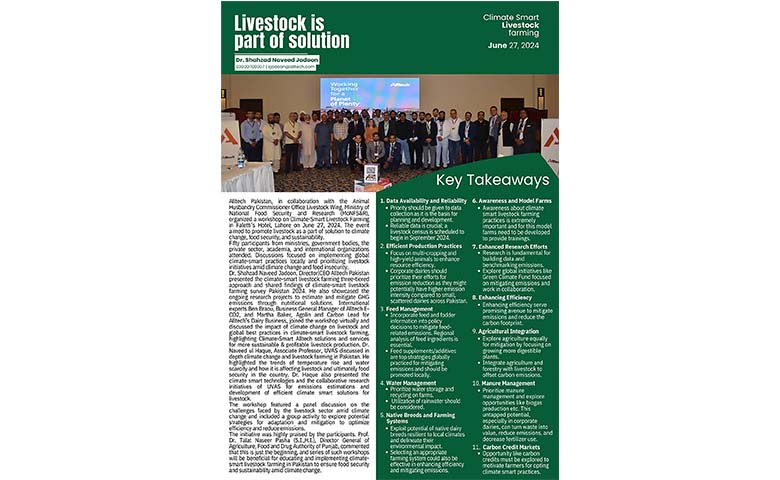Dr. Shahzad Naveed Jadoon, 03000700007 | sjadoon@alltech.com
Alltech Pakistan, in collaboration with the Animal Husbandry Commissioner Office Livestock Wing, Ministry of National Food Security and Research (MoNFS&R), organized a workshop on Climate-Smart Livestock Farming in Faletti’s Hotel, Lahore, on June 27, 2024. The event aimed to promote livestock as a part of solution to climate change, food security, and sustainability.
Fifty participants from ministries, government bodies, the private sector, academia, and international organizations attended. Discussions focused on implementing global climate-smart practices locally and prioritizing livestock initiatives amid climate change and food insecurity.
Dr. Shahzad Naveed Jadoon, Director | CEO Alltech Pakistan presented the climate-smart livestock farming three-tiered approach and shared findings of climate-smart livestock farming survey Pakistan 2024. He also showcased the ongoing research projects to estimate and mitigate GHG emissions through nutritional solutions. International experts Ben Braou, Business General Manager of Alltech E-CO2, and Martha Baker, Agolin and Carbon Lead for Alltech’s Dairy Business, joined the workshop virtually and discussed the impact of climate change on livestock and global best practices in climate-smart livestock farming, highlighting Climate-Smart Alltech solutions and services for more sustainable & profitable livestock production. Dr. Naveed ul Haque, Associate Professor, UVAS discussed in depth climate change and livestock farming in Pakistan in depth. He highlighted the trends of temperature rise and water scarcity and how it is affecting livestock and, ultimately, food security in the country. Dr. Haque also presented the climate smart technologies and the collaborative research initiatives of UVAS for emissions estimations and development of efficient climate-smart solutions for livestock.
The workshop featured a panel discussion on the challenges faced by the livestock sector amid climate change and included a group activity to explore potential strategies for adaptation and mitigation to optimize efficiency and reduce emissions.
The initiative was highly praised by the participants Prof. Dr. Talat Naseer Pasha (S.I.,H.I.), Director General of Agriculture, Food and Drug Authority of Punjab, commented that this is just the beginning, and a series of such workshops will be beneficial for educating and implementing climate-smart livestock farming in Pakistan to ensure food security and sustainability amid climate change.

Key Takeaways
- Data Availability and Reliability
- Priority should be given to data collection, as it is the basis for planning and development.
- Reliable data is crucial; a livestock census is scheduled to begin in September 2024.
- Efficient Production Practices
- Focus on multi-cropping and high-yield animals to enhance resource efficiency.
- Corporate dairies should prioritize their efforts for emission reduction as they might potentially have higher emission intensity compared to small, scattered dairies across Pakistan.
- Feed Management
- Incorporate feed and fodder information into policy decisions to mitigate feed-related emissions. Regional analysis of feed ingredients is essential.
- Feed supplements/additives are top strategies globally practiced for mitigating emissions and should be promoted locally.
- Water Management
- Prioritize water storage and recycling on farms.
- Utilization of rainwater should be considered.
- Native Breeds and Farming Systems
- Exploit potential of native dairy breeds resilient to local climates and delineate their environmental impact.
- Selecting an appropriate farming system could also be effective in enhancing efficiency and mitigating emissions.
- Awareness and Model Farms
- Awareness about climate smart livestock farming practices is extremely important and for this model farms need to be developed to provide trainings.
- Enhanced Research Efforts
- Research is fundamental for building data and benchmarking emissions.
- Explore global initiatives like Green Climate Fund focused on mitigating emissions and work in collaboration.
- Enhancing Efficiency
- Enhancing efficiency serve promising avenue to mitigate emissions and reduce the carbon footprint.
- Agricultural Integration
- Explore agriculture equally for mitigation by focusing on growing more digestible plants. Integrate agriculture and forestry with livestock to offset carbon emissions.
- Manure Management
- Prioritize manure management and explore opportunities like biogas production etc. This untapped potential, especially in corporate dairies, can turn waste into value, reduce emissions, and decrease fertilizer use.
- Carbon Credit Markets
- Opportunity like carbon credits must be explored to motivate farmers for opting climate smart practices.